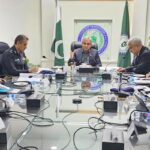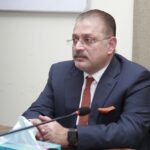UNITED NATIONS, Jun 21 (APP):A top Pakistani diplomat has urged the international community to end “selective” application of international humanitarian law, as he made a case for humanitarian assistance for the suffering people in the Illegally Indian Occupied Jammu and Kashmir (IIOJK).
“The plight of people who are subjected to foreign occupation deserves special attention,” Ambassador Munir Akram, Permanent Representative of Pakistan to the United Nations, told UN Economic and Social Council (ECOSOC’s) Humanitarian Affairs Segment on Tuesday.
This segment is a unique platform that brings together UN member states, UN organizations, humanitarian and development partners, the private sector and affected communities to discuss on how to best tackle the most recent and pressing humanitarian concerns.
Earlier, Ambassador Akram, who is the Chairman of the Group of 77 (developing countries) and China, delivered a separate statement on behalf of the group in which he also called for respecting the humanitarian principles of neutrality, impartiality and independence in all circumstances.
Delivering his national statement, the Pakistan envoy said, “Approximately 2.1 million Palestinians need humanitarian assistance and $510 million is required to address their plight. Similarly, an estimated 95 percent of Afghans are without sufficient food, as the ongoing humanitarian crisis in Afghanistan intensifies.”
But in the case of the persecuted people of Illegally Indian Occupied Jammu and Kashmir, Ambassador Akram pointed out that the United Nations had no access to the Kashmiris and no ability to help them in their plight, where they were oppressed daily by 900,000 Indian troops.
“The oppressed people of Illegally Indian Occupied Jammu and Kashmir are also in dire need of humanitarian assistance,” the Pakistani envoy added.
On its part, he said, Pakistan had borne the burden of hosting millions of Afghan refugees for over four decades.
Pakistan had also faced humanitarian emergencies arising from natural disasters and climate related events, and had been ranked as one of the top ten countries most affected by climate change in the past 20 years despite being one of the lowest emitters, he added.
Ambassador Akram said humanitarian assistance should be responsive to the needs of the country or community hosting refugees, displaced and destitute people.
Imposing pre-conditions on humanitarian assistance was immoral, and financing should be mobilized from all sources and channels, public and private, he said, adding that it should not become a victim of geopolitics.
“We must work collectively to promote the vision of an equal and inclusive world where no one is left behind.”
“But”, he said, “the experience that we have had in the past three years, is not edifying for those who are vulnerable and poor.”
In response to the COVID pandemic, the ambassador said $17 trillion were injected as fiscal stimulus by the richer countries, while the poorer countries had access to less than $100 billion SDRs (Special Drawing Rights), which had been created and the unutilized had not been redistributed to meet the needs of the developing countries.
In his statement on behalf of G77 and China, Ambassador Akram called for addressing root causes of humanitarian emergencies, and mobilizing resources for humanitarian assistance which were adequate to meet needs of the affected people without any form of discrimination.
In this context, along with armed conflicts, similar attention should be devoted to the impacts of infectious and non-communicable diseases and the adverse effects of climate change, especially those that were irreversible, he stressed.
He said an investment of $1.5 trillion was needed annually in sustainable infrastructure in the developing countries to recover from the pandemic and transition to environmentally sustainable economies.
“The UN can and must play a leading role in mobilizing this investment.”
The G77 chief urged the developed countries to fully deliver on the long overdue and as yet unrealized goal to mobilize $100 billion per year for climate finance for developing countries.
The Group, he said, “stresses the importance of ensuring global and equitable access to safe, timely and effective Covid-19 vaccines, in addition to enhancing local and regional manufacturing through technology transfer and knowledge sharing”.





